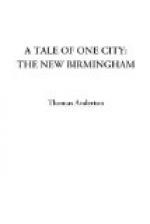Those visitors to Elkington’s who penetrate beyond the show rooms will find much to interest, and in some cases to mystify them. Electro-plating is indeed almost a magical sort of craft. How it is that dirty looking metal spoons can be put into a dirty looking bath and come out white and silvered must amaze and bewilder many strange eyes. Impassive as Asiatics can be, I should much like for once just to watch the eyes of an eastern conjuror and magician when he saw the electro bath trick, and especially when done in the way and on the scale that may be witnessed at the Birmingham Newhall Street works.
With regard to Mr. Joseph Gillott’s pen manufactory it is a very interesting show place, but is practical and prosaic compared with the art electro-plate establishment I have just now referred to. Those, however, who like to see processes, and something going on quickly from stage to stage, find Mr. Gillott’s factory a place of almost fascinating interest. They can, indeed, observe the steel pen emerge from its native metal, see it pressed and stamped, and again pressed and stamped, slitted, annealed, coloured, and finally boxed and packed. They can also see the penholders produced and inhale the sweet and pungent fragrance of cedar wood, and they can look on the production of the pen boxes which are made in so many attractively coloured varieties.
All this is to be seen in the course of a little march through Mr. Gillott’s factory, which is, indeed, a pattern of order and cleanliness, and so well conducted as to be almost like a real adult school of industry. Female labour is largely employed—as is customary in the pen trade—the nimble fingers and deft hands of many girls finding useful employment, without fatiguing labour, in the various processes of the pen-making business.
Pen-making is, of course, a great industry, but there are pens and pens, and for some of the lower qualities the trade price is of incredible cheapness. I sometimes think that if an enterprising merchant were to try and place an order for a million gross of steel pens at 1d. per gross, and 75 per cent. discount for cash, he would succeed in doing it. The quantity it is that pays.
The pleasure and interest of going over Mr. Gillott’s establishment is enhanced by the fact that visitors see the popular pens of commerce and the aristocratic pens of what Jeames calls the “upper suckles” made, so to speak, side by side. The Graham Street works could not be kept going by merely making dainty gold pens, fine long barrelled goose quills, and other such superior productions. The everyday person muse be considered and supplied with everyday pens, and the everyday person, although he buys cheap pens, is a more profitable customer than he looks.
A well-known mustard maker has been known to say that he makes his profit out of what people leave on their plates. In other words, the everyday waste of people vastly increases mustard consumption. In the same way the everyday pen is so cheap that it is not used with care and economy. It is lightly thrown aside often before it is half worn, and is often objurgated and wasted because it is dipped into bad ink. But what does it matter when you can get a gross of pens for just a few pence.




